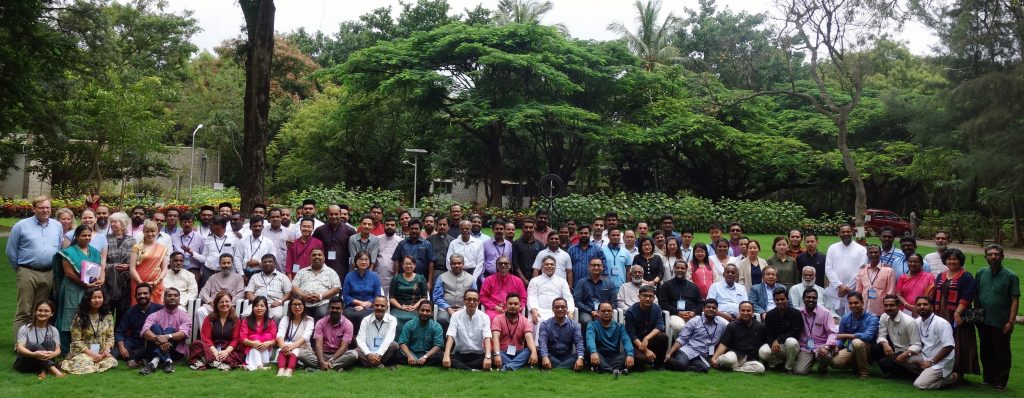Ecumenical consultation affirms Christians to be sensitive to other faiths
 participants of the International Consultation
participants of the International Consultation
An international ecumenical consultation on ‘Wider Ecumenism as Prophetic Witness’ affirmed that “Christians have to recognize God’s image in adherents of all religious traditions and Asian Christians must be sensitive to the tremendous contributions the other religions are still making to the shaping of Asian culture”.
Jointly organised by the Christian Conference of Asia (CCA), Association of Christian Institutions for Social Concerns in Asia (ACISCA), Board of Theological Education of Senate of Serampore College (BTESSC) and the Ecumenical Christian Centre (ECC), the consultation was hosted by the Ecumenical Christian Centre in Bangalore, India and held from 7 to 11 August 2018.
The consultation was attended by 110 participants.
The participants affirmed that “love is the essence of Trinity and the Trinitarian faith; engaging each other in interfaith dialogue should aim at strengthening our understanding on wider ecumenism as prophetic witness”.
In his inaugural address Bishop Dr. Geevarghese Mar Theodosius, Chairperson of the Ecumenical Christian Centre stated that ecumenism should always be understood in a context of wider realities arising in our societies and communities and that prophetic witness was inseparable, especially in contexts where peace with justice was negated.
The General Secretary of CCA, Dr. Mathews George Chunakara in his introductory address at the opening session of the Consultation said, “The wider dimension of ecumenism in terms of addressing emerging challenges was redefined and recognised globally in the past decades. However, as the shift in the ecumenical paradigm has been changing the traditional concept, the role of the ecumenical movement also should be reassessed, especially in terms of articulating the vision of ecumenism from a perspective of ecclesial unity to wider ecumenism”.
“The imperative to search for the meaning of wider ecumenism as prophetic witness has to be recognised in order to hold on the vision of the Oikoumene”, added the CCA General Secretary.
In a keynote address delivered at the opening session of the consultation, Bishop Dr. Daniel Thiagarajah of Sri Lanka said, “We have come to a point where we cannot theologize apart from making relevant connections with the religions among which are placed”.
“While it is encouraging that a number of churches are beginning to take note of interfaith cooperation, many still continue to focus purely on the western missionary preoccupation of numerical growth of the church , thus ignoring the harmony of Asian society as well as dividing the Asian Christians”, added Bishop Thiagarajah.
Prof. Dr. Mathew Chandrakunnel, Director of the Ecumenical Christian Centre stated that the thematic focus of the consultation and the platform provided for the Asian churches and Asian ecumenical organisations would strengthen a collective effort to wider ecumenism in Asia.
In the presentation on wider ecumenism as prophetic witness from a gender perspective, Dr. Naw Eh Tar Gay from Myanmar Institute of Theology focused on the role of women in prophetic engagement in the context of Asia.
Fr. Jose Kuttiani Mattathil of the Roman Catholic Church in India suggested a shift from classical western ecumenism to a God-centred Trinitarian ecumenism which would gradually lead to strengthening wider ecumenism in Asia.
Caroline Basutti of the Focalare Movement added that nurturing spirituality will strengthen wider ecumenism in all contexts.
Rev. Prem Mitra of the Church of South India reminded the need for a theological presupposition which will engage in the context of wider ecumenism in Asia. He further mentioned the need for valuing of “a paradigm shift from human-centric ecology to biodiversity-centred ecology”.
While depicting the concepts of ‘realised catholicity and wider ecumenical vision’, Dr. Jakob Tronet of Chruch of Sweden stated, “Catholicity is not only a principle or collection of doctrinal points but something that is made manifest in the life of the church: it is in the practises of the church that its catholicity becomes realised.”
In a panel discussion on ‘Reconfiguration of Ecumenism Beyond Christian Ecumenism’ Rev. Dr. Jayasiri Pieris of the Theological College of Lanka said, “a festival model of ecumenism which will bring friendship and solidarity with the victims will be most valuable in Asia”.
Rev. Dr. Santanu Kumar Patro of the Senate of the Serampore outlined the reasons for the failure of Church-centred ecumenism today and emphasised the need for wider ecumenism on the basis of a God-centred ecumenism which was more relevant to the Asian context.
Rev. Dr. Binsar Jonathan Pakpahan of the Jakarta Theological Seminary in Indonesia said, “Rooting ecumenism in love that maintains justice in journeying together with all people and other religions in Asia is required”.
Rev. Dr. Emmanuel Thathapudi, Secretary of the BTESSC said “The ecumenical movement has become rusty after half-a-century of its existence, and a move for a new form of ecumenism or wider ecumenism is inevitable in Asia”.
Venerable Khenpo Rimpoche of Tibetan Buddhism shared the values offered by Buddhism to transform painful situations into conditions that foster progress on the spiritual path. He said “As much as we try, we cannot tailor the world to suit our own ways and unwanted circumstances may lead to feelings of frustration, victimization or anger”.
Swamiji Mahagate, a Hindu monk from Nepal urged the participants to find the values of unity in diversity as one could not distinguish or discriminate other persons on the basis of their religious identity as they were absorbed in the infinite spirit.
“One sees differences only on a lower level but from the pinnacle of God’s love, all distinctions disappear”, said Swamiji Mahagate.
A communique adopted at the end of the consultation stated that “Wider ecumenism and the Missio Dei have deep hermeneutical links and pave the way towards the unity of the entire oikoumene”.
Click here download <<communique>> International-Consultation-on-Wider-Ecumenism-as-Prophetic-Witness-Communique.pdf










